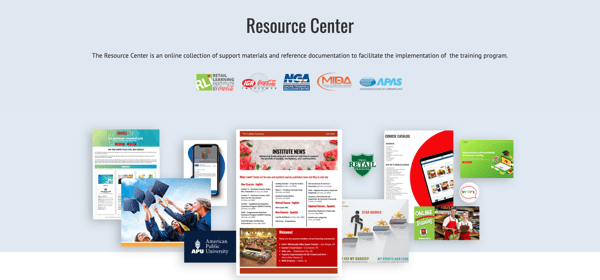Help Isom IGA recover from devasting floods

In the last year, independent retailers and associates have experienced countless unexpected changes. From talking (and smiling) through masks to navigating transactions through plexiglass and beyond, grocery employees have adapted to new rules and ever-changing protective guidelines quickly. With so many changes that need to be implemented immediately, it's easy to forget basic training. But that is the foundation of employment anywhere, and especially in the food service industry.
"We know it's hard to stay on top of trainings with everything going on right now in the grocery industry," says IGA Coca-Cola Institute President Paulo Goelzer. "That's why the Institute makes courses available online—so your associates can watch them when it's convenient in a format that makes it easy to understand and retain the information."
IGA members receive access to required training classes from the IGA Coca-Cola Institute for free, so add these required and recommended trainings to your 2021 checklist. And if you're looking for a better way to stay organized, see the tips below on creating a learning plan and leveraging the Institute's new Resource Center.
Required Trainings
While required trainings vary depending on the job or department and often by state, the below courses are required for each grocery store employee, regardless of role and location.
Bloodborne Pathogens

Accidents can happen in the workplace and it’s important to be prepared. This class will teach attendees:
- What are bloodborne pathogens (BBPs) and how they are transmitted
- Common types of BBPs and treatment options
- How to protect against BBPs
- Clean up, disinfection, and disposal procedures for contaminated areas
Food & Safety Sanitation Basics

Public health has seen vast improvements in recent years, but nevertheless, there are still cases of food-borne illness that can result in hospitalization, or even death.
As a representative of the food retail industry, a grocery employee may be one of the last people to handle a consumer's food before it reaches his or her home. For this reason, it is vital that they ensure the store is sanitized and the food sold is safe for consumers to eat.
Attendees will learn to:
- Identify temperature requirements for food
- Identify ways to keep equipment free of food contamination
- Select good hygiene practices to follow when working with food
- Identify the different federal regulated food inspected symbols
OSHA Hazard Communication Standards

OSHA Hazard Communication System (HCS) now includes the criteria and provisions listed in the United Nations Globally Harmonized System of Classification and Labeling of Chemicals, known as GHS.
The modifications to HCS affect the labeling of hazardous materials as well as the safety data sheets that accompany these products. Food retail associates must be familiar with these formats when they see them on hazardous products in the workplace.
Attendees will learn how to:
- Identify GHS label components
- Identify SDS format guidelines
- Determine the section location of information within the SDS
Sexual Harassment

Two tracks are available for the sexual harassment class: one for employees and one for supervisors.
Employees:
Awareness of sexual harassment in the workplace has increased rapidly in recent years, and retailers must communicate to every associate that sexual harassment will not be tolerated within their stores. This is accomplished by implementing a sexual harassment program that ensures all associates understand and comply with the standards of Title VII of the Civil Rights Act of 1964.
In this course, employees will learn:
- Facts and characteristics of sexual harassment
- Different types of sexual harassment
- What to do if they find themselves in a sexual harassment situation
- Identify physical and psychological effects of sexual harassment
Supervisors:
A prompt and effective response to a complaint can limit or entirely eliminate an employer’s liability in a discrimination, harassment, or retaliation lawsuit. It is imperative that employers implement an effective mechanism to investigate and resolve workplace complaints.
Attendees will learn:
- How to investigate a sexual harassment claim
- How to educate employees about sexual harassment
- What should be included in a sexual harassment policy
Supplemental Nutrition Assistance Program (SNAP) Training

SNAP retailers are legally responsible for their actions and the actions of everyone who works in the store, whether they are paid or not. When retailers apply to accept SNAP benefits, they agreed to fulfill certain training expectations. The materials provided in this course, which includes a guide that answers common SNAP questions and videos on SNAP guidelines, transactions and payment, and information for cashiers, will help retailers and associates fulfill those expectations.
Recommended Trainings
While the below trainings may not be required for each state, they're beneficial for all employees, according to IGA Coca-Cola Institute Training and Development Manager Jason King. "I recommend all grocery store employees take the Lock Out/Tag Out and Active Shooter Awareness classes," he says. "It's better to be prepared, just in case." Additionally, the Institute has made the following COVID-19 courses available for free.
Lock Out/Tag Out

This course trains associates on Lock Out/Tag Out procedures. Learn which devices are lock out, which use a lock and key to secure it in an off or safe position, and which are tag out, which use tags to communicate when they are in use. Attendees will also learn how to safely manage equipment powered by electrical plugs, hardwire, alternative energy sources (air hose, gas or water pipes, etc.).
Active Shooter Awareness

Using a grant funded by the Department of Homeland Security (DHS) and produced by the Mayor of Houston's Office of Public Safety along with DHS, this class prepares associates for an active shooter event.
The methodologies presented in the class recap best practices for surviving an active shooter event as recommended by local law enforcement. All individuals must use their own discretion during an active shooter event. Disclaimer: The video in this class contains gun violence that some viewers may find disturbing.
Hand Washing

Hand washing is especially important during the pandemic. Scrubbing your hands for just 20 seconds can prevent the spread of infectious diseases. In this course, attendees will learn when and how to wash their hands to stay healthy and prevent the spread of germs.
Crisis Preparedness

According to the Food Marketing Institute (FMI), each of the intervention approaches presented in this course requires strategic planning, communication, and flexibility to ensure effective response. To achieve maximum benefit, develop and implement a strategy to encourage beneficial personal protective measures, environmental protective measures, and community distancing measures.
10-minute Pandemic Awareness

In this 10-minute video module, attendees will learn what a pandemic is, the history of pandemics, and what they can do to help in a global pandemic.
Cleaning and Sanitizing: High Touch Surfaces

Food retailers play a critical role in protecting public health during the COVID-19 pandemic and beyond. Stores must maintain a clean and sanitary facility to ensure the health and well-being of all customers and employees. Cleaning and sanitation procedures for frequently touched surfaces can help protect customers and employees. While some grocery stores are limiting store hours to thoroughly clean and disinfect their entire store before opening the follow morning (i.e., deep clean), others are more aggressively cleaning and sanitizing high touch surfaces throughout the day to reduce the risk of transmission.
Learning Plans
The best way to ensure associates complete their required and recommended trainings is through a learning plan. Learning Solutions Director Ana Velázquez encourages retailers and managers to create a learning plan for each department. “Retailers should review the course catalog to choose the courses they want their employees to take, then set deadlines for their employees to complete the courses,” she says. “An easy and common deadline is just before annual performance reviews.” By creating a learning plan for each department, retailers set clear goals for employees and provide a path to professional development.
Each learning plan should include:
- A list of required classes for the department and/or position
- Length of each class
- Due date for completion of each class
- Space to indicate when the class is completed
- Assigned coach or mentor for the individual employee to use as a resource for questions or guidance
Veláquez recommends allowing employees to choose a few classes that are of interest to them outside of the required topics and add those to their individual learning plans. Find the course catalog here and work with your managers and HR departments to create a learning plan for each department if your store doesn't already have one.
The Resource Center

To stay updated and in the know on the latest courses, programs, and compliance requirements, retailers can visit the Resource Center, which is an online collection of support materials and reference documentation available to administrators and learning leaders responsible for the online training program at their organization.
There are four sections in the center:
- Administrator’s How-to—Quick links to courses, videos, and materials that help the administrator manage their online training program
- Marketing Materials—Download flyers to promote the online training program and its features in stores
- Quarterly Newsletter—Keep up-to-date with the program, courses, upgrades, and new features; see who is joining the program, outstanding users, best practices, etc.
- Articles—Industry press dedicated to the Institute’s online training program
The Administrator's How-to section also includes frequently needed job descriptions, which are especially helpful during the pandemic when grocery stores are hiring often. “These assets are very timely with the hiring surge,” Velázquez says, adding that this resource can help retailers hire quickly and efficiently.
Administrators and retailers can use the customizable flyers found in the Marketing Materials sections to promote courses in-store. “All they have to do is come here to download the files, then they can print and post in their breakrooms,” says Velázquez.
She also recommends administrators and retailers sign up for the Institute's quarterly newsletters to learn of new courses, courses to be retired, and more. “Once people finish their training, they don’t revisit it enough,” Velázquez says. “So they should sign up for the newsletter to find out what’s new—for courses and marketing materials.
The IGA Coca-Cola Institute is standing by with the resources retailers need to stay on top of 2021 required and recommended trainings. To ensure employees are up to date with the basics of their job—and therefore well-trained, confident, and prepared for any unexpected changes the year ahead may bring—create a learning plan for each department with these classes, allow associates to choose a few additional classes of interest, and leverage the resources available to promote trainings and career development.
Previous Story
← Honor Your Team on Supermarket Employee Day
You May Also Like
These Stories on Institute Insights
Jan 10, 2024 6:39:14 PM |
4 min read
Jul 26, 2023 9:34:00 AM |
2 min read
May 22, 2023 2:39:43 PM |
1 min read



No Comments Yet
Let us know what you think